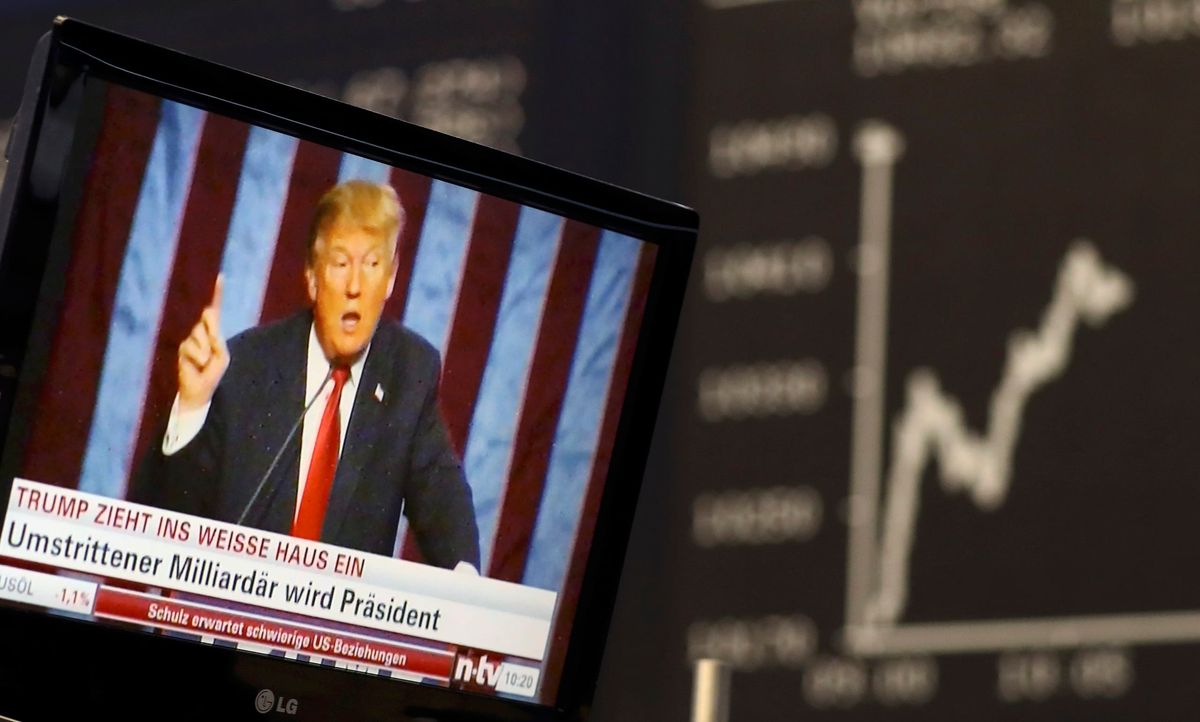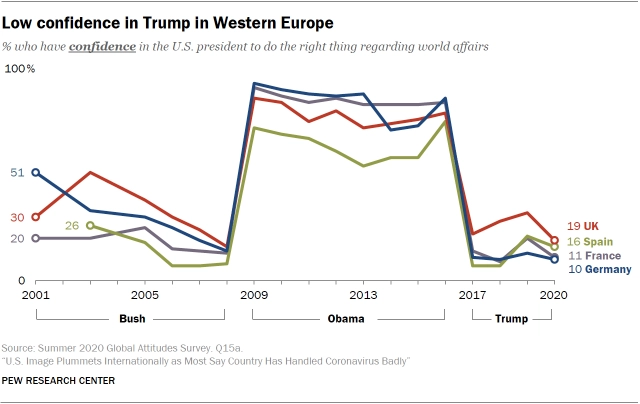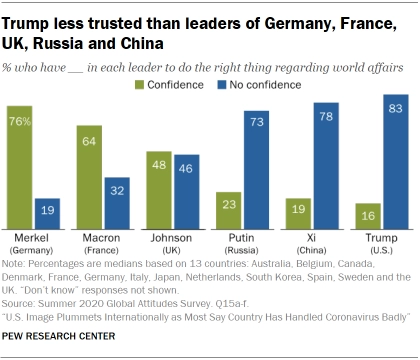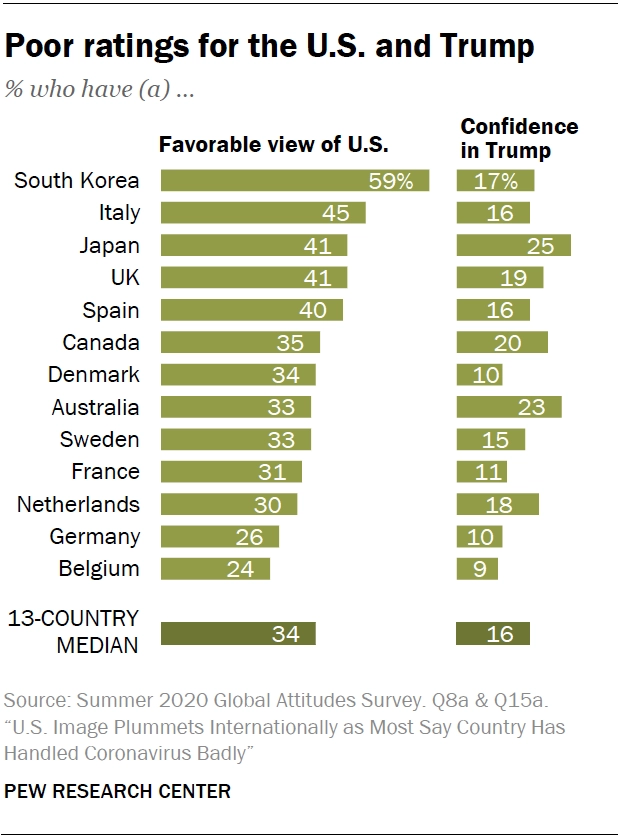How does the world view the US after Trump?

A few minutes every morning is all you need.
Stay up to date on the world's Headlines and Human Stories. It's fun, it's factual, it's fluff-free.
Although international ratings for Russian President Vladimir Putin and Chinese President Xi Jinping are overwhelmingly negative, they remain higher than those of President Trump.
With President-elect Joe Biden set to take office this week, how does the rest of the world view the United States after four years of President Donald Trump?
It’s unsurprising that in the wake of the January 6 insurrection at the US Capitol building, America’s international neighbors ran articles with titles like “Anarchy in the US” (in the United Kingdom’s Metro Newspaper) and “Trump plunges US into chaos” (in the Netherlands’ De Telegraaf).

According to a survey from the Pew Research Center, America’s reputation has steadily declined since Donald Trump’s inauguration and the international community now views the US less favorably than at any point since the center began polling on the question nearly twenty years ago.
Just 41% of those in the UK, 31% in France and 26% in Germany expressed a favorable opinion of the US, with German and French opinion equal to what it was in March 2003, at the start of the Iraq War.

The poll, which takes into account 13,273 respondents in 13 countries, reflects skepticism over the route the country has taken during Trump’s four years in office.
When did this regression begin?
“Several high-profile policy and political differences have exposed fault-lines in the bedrock of the trans-Atlantic relationship,” Tommy Goodwin, an expert in international public policy and political affairs, tells TMS.
“Starting with various trade disputes in the Iraq War in the 2000s, the EU and its Member States came to view the US more skeptically which began to erode their collective trust in the US, its leaders, and its broader commitment to multilateralism and multilateral institutions like the EU itself,” says Goodwin.
In 2017, at the annual G-7 Summit where the world’s economic powers gather, leaders appeared simply relieved that the US president was even there.
What’s more, at the end of the summit, Trump refused to certify the customary joint communiqué delineating the group’s priorities for the future. Shortly thereafter, he withdrew the US from the Paris Agreement on climate change. Trump then spent the remaining years of his term criticizing the North American Treaty Organization (NATO), calling the European Union America’s “foe,” withdrawing from the Iran nuclear deal and imposing tariffs on European trade.
Unsurprisingly, this led to heightened tensions. The same Pew survey reveals that only a third of respondents across the EU countries hold a positive view of the US.
In fact, although international ratings for Russian President Vladimir Putin and Chinese President Xi Jinping are overwhelmingly negative, they remain higher than those of President Trump.
As for other world leaders, an average of 76% across the 13 nations have confidence in German Chancellor Angela Merkel. The majority also hold favorable views of French President Emmanuel Macron while ratings are roughly split for British Prime Minister Boris Johnson.
Analysts suggest that such views on a country generally coincide with confidence in its leadership. That would indicate that an average of only 16% of those surveyed have confidence in President Trump.

US COVID-19 response
As for the coronavirus outbreak, favorable views of Trump’s response also correspond to support for right-wing political ideology. Although ratings are still low among both groups, those who lean right are more likely to think the US has done an adequate job handling the pandemic.
Still, every nation surveyed ranks the US the lowest in its response to the coronavirus. Few of the 13 nations surveyed endorse America’s response and only 15% believe the country’s handling of the pandemic was effective.
Only 6% in South Korea, 7% in Denmark and 9% in Germany believe the US has handled the pandemic well.
Alternatively, in all 13 countries polled, nearly 80% say the US has handled the virus poorly and all but two of those say that the US has done a “very bad” job dealing with the outbreak.
Another poll, this one by the European Council on Foreign Relations (ECFR), found that just 2% of Europeans surveyed believe the US was a “helpful” ally in the fight against the coronavirus.
This sentiment was particularly striking in France and Germany, where 46% and 42% said their opinion of the US worsened “a lot” during the pandemic.
“The proportion of respondents who felt that the U.S. had been a key ally through the crisis was vanishingly small, with the largest proportion in Italy, at just 6%,” the report noted.
Germany
According to the survey, Germans hold some of the most unfavorable views of the US, with only 26% maintaining a positive view of the US and a mere 10% confident in President Trump’s handling of international affairs.
The polls are a glaring juxtaposition to the favorable assessments Germany had of America under President Barack Obama’s administration. At that time, 84.5% of Germans reported feeling confidence in the sitting US president.
Belgium
Trump’s least favorable assessment is in Belgium, where only 9% say they have confidence in his handling of world affairs.

Denmark
Denmark holds the most prominent gender gap, with 42% of men rating the US favorably, compared to only 26% of women.
Spain
A larger share of Spain views the US positively in 2020 than in 2017. However, not as many Spaniards view the US as positively as did during President Obama’s time in office.
Spain also maintains a similarly large gap to Denmark in terms of gender, with 48% of men and only 33% of women rating the US favorably. The gender disparity in other countries polled is roughly 10%.
Supporters of the Spanish Vox party, a far-right populist party, are also significantly more likely to hold favorable opinions of the US under President Trump, with 73% of Vox-voters holding a favorable opinion of the US, compared with only 29% of those who view the far-right party unfavorably.
Those surveyed in Spain maintain the most optimistic assessment of the US response to COVID-19, with a total of 20% stating the US handled the pandemic well.
The positive effect of the Trump presidency
Despite the overwhelmingly negative perception of Trump, some analysts argue his presidency has had a positive effect on nations worldwide.
Such experts point to Trump’s insistence that EU leaders encourage expansion and reform, an idea Emmanuel Macron echoed in his speech at the Sorbonne in 2017. He suggested that the conditions that allowed the EU to thrive after World War II were no longer present and that further integrating other nations in the EU would benefit the union.
Analysts have also argued that Trump encouraged self-sufficiency within the EU, whether consciously or unconsciously, by showing that the union could no longer rely on America.
These critics can also point to Trump’s decision to support the “Three Seas Initiative,” the purpose of which is to create cooperation among 12 EU nations to counter Chinese and Russian power.
Likewise, President Trump effectively launched a new trade war with China, which some believe to have been beneficial for America’s allies.
“The election of President Trump ignited the EU-US relationship powder keg. For a region and policymaking system highly dependent on multilateral institutions, consensus building, and incrementalism, Trump’s “America First” foreign policy and impatience with global institutions stood in direct contrast to the foundational elements of the EU,” Goodwin says.
“Trump was a shock to the European system and set the stage for the new geopolitical EU we see emerging today.”
Still, despite the minority who view Trump’s presidency auspiciously, it’s clear that the majority look toward January 20 – the day of President-elect Biden’s inauguration – with optimism.
“If anything, President Biden is an institutionalist,” Goodwin says. “He served in the US Senate for 36 years (including as chairman of the Foreign Affairs Committee) and as US vice president for eight years. During this time, he has demonstrated a deep and long-standing commitment to global and multilateral institutions. That’s why the EU can expect somewhat of a return to normal service under President Biden.”
Nevertheless, Goodwin believes that “Europe is unlikely to forget that the long-standing US-EU relationship is still only an election away (in 2024) from a return to uncertainty and destabilization across Europe.”
Have a tip or story? Get in touch with our reporters at tips@themilsource.com




Comments ()